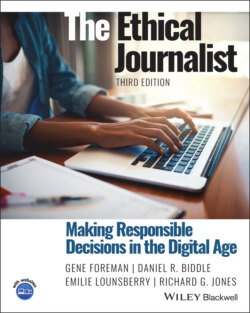Читать книгу The Ethical Journalist - Gene Foreman - Страница 46
What Caused the Ethical Awakening?
ОглавлениеThe code‐writing in the 1970s and 1980s was a manifestation of greater ethical awareness in the newsroom, a maturing of the profession. Why did the phenomenon occur when it did? These are some likely reasons 39 :
Embarrassment. Scandals were rocking the industry, the most noteworthy being the Janet Cooke case at The Washington Post. The Post had to give back a Pulitzer Prize in 1981 after Cooke, under intense questioning, admitted that she had made up her prize‐winning story of an eight‐year‐old heroin addict named in the paper only as Jimmy. Roy Peter Clark of the Poynter Institute calls this episode “the alpha event in the history of media ethics.” The Cooke scandal, Clark has written, “did not invent the field of media ethics, but it certainly fertilized it. Articles, seminars, programs, journals sprang up everywhere.” 40
A new generation of journalists. As older journalists retired, the traditions of their era faded. The new generation, better educated and more idealistic, had come into the profession in the decades after the Hutchins Commission defined social responsibility. The drive for professionalism came not just from newsroom leaders but also from the rank‐and‐file newsroom staff.
The nature of the news. Journalists were covering government and society’s institutions more critically than ever, and they were reporting on officials who lied to the public. The Vietnam War and Watergate were prime examples. If you are going to point out transgressions by people in public life, it follows that you need to get your own house in order.
More scrutiny. The media watchdogs were themselves being increasingly watched. Back then, the scrutiny came from local and national journalism reviews, alternative weeklies, and a handful of mainstream media critics. Although only the Columbia Journalism Review survives today as a national presence online and in print, the watchdog function has become the province of all manner of critics who have the capacity through the internet to call the media to account.
Chain ownership. The shift from local ownership of newspapers and broadcast stations was not without its negative effects, but many papers and stations improved under chain ownership that grew in the second half of the twentieth century. The new corporate owners tended to be attuned to industry trends, including ethics awareness, unlike some local owners who had often been isolated and arbitrary. Under a local owner, the Lexington (Kentucky) Herald and its sister Lexington Leader ignored the 1960s civil rights demonstrations that were changing the city’s social fabric. 40 In 1985, under the ownership of Knight Ridder, the merged Herald Leader courageously reported cash payoffs to University of Kentucky basketball players in violation of National Collegiate Athletic Association (NCAA) regulations, enduring a storm of criticism from the state’s basketball fans.
Fear of libel lawsuits. The news industry was reeling from big libel judgments. Gil Cranberg of the University of Iowa, after surveying 164 libel plaintiffs for a study published in 1987, concluded that if journalists are seen as ethical, they are less likely to be sued. Most of the plaintiffs in the survey told Cranberg that they would not have sued if the newspaper or station had taken their complaints seriously and run a correction. 41
Whatever its origins, the emphasis on written professional standards produced yet more awareness of ethics. It became common in the newsroom to talk about ethics and to raise questions — the process that Sandra Rowe, editor of The Oregonian, described in Chapter 1. These discussions often were facilitated by outside ethicists like those at the Poynter Institute in St. Petersburg, Florida, which was established in 1975 and has become journalism’s leading in‐service training center and think tank. Over time, newsrooms placed more stress on having a process for discussing and deciding ethics issues rather than on trying to envision a comprehensive set of commandments.
For all that, there is still mild debate about whether journalism is a profession. This text takes the position that it is, while conceding that it lacks a few of the distinguishing characteristics of a profession. The most significant of these differences is that journalists are not governed by a formal organization with authority to set educational requirements for entering the profession and performance standards for continuing in it. 42 The First Amendment prohibits such regulation. To distinguish themselves from the pretenders, responsible journalists subscribe voluntarily to standards of accuracy, fairness, and independence.
